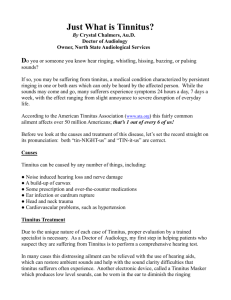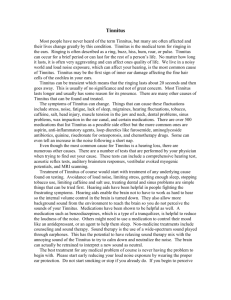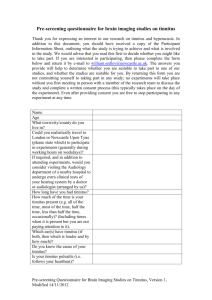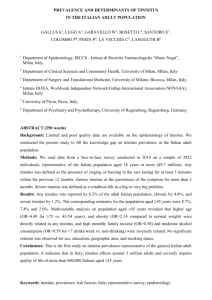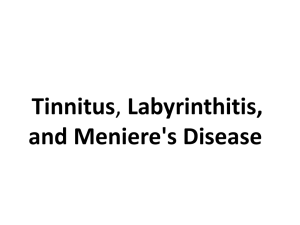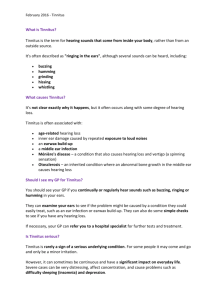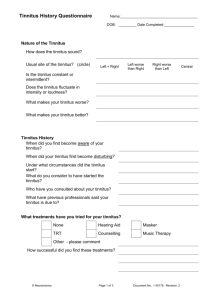What You Should Know Before Accepting Tinnitus Clients
advertisement
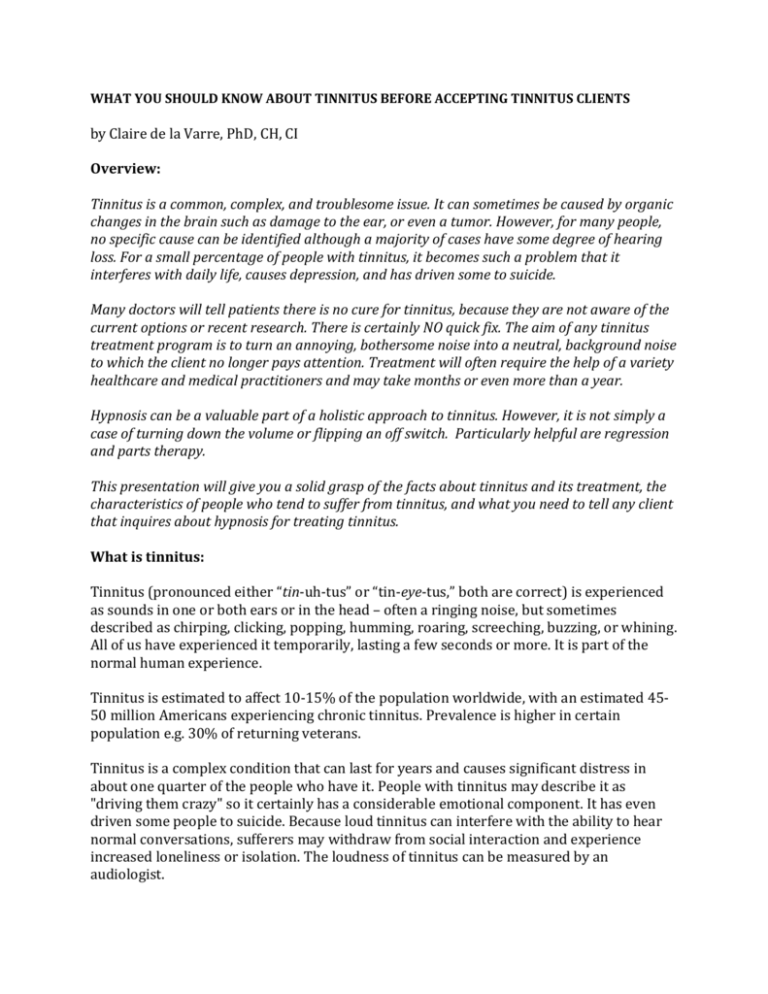
WHAT YOU SHOULD KNOW ABOUT TINNITUS BEFORE ACCEPTING TINNITUS CLIENTS by Claire de la Varre, PhD, CH, CI Overview: Tinnitus is a common, complex, and troublesome issue. It can sometimes be caused by organic changes in the brain such as damage to the ear, or even a tumor. However, for many people, no specific cause can be identified although a majority of cases have some degree of hearing loss. For a small percentage of people with tinnitus, it becomes such a problem that it interferes with daily life, causes depression, and has driven some to suicide. Many doctors will tell patients there is no cure for tinnitus, because they are not aware of the current options or recent research. There is certainly NO quick fix. The aim of any tinnitus treatment program is to turn an annoying, bothersome noise into a neutral, background noise to which the client no longer pays attention. Treatment will often require the help of a variety healthcare and medical practitioners and may take months or even more than a year. Hypnosis can be a valuable part of a holistic approach to tinnitus. However, it is not simply a case of turning down the volume or flipping an off switch. Particularly helpful are regression and parts therapy. This presentation will give you a solid grasp of the facts about tinnitus and its treatment, the characteristics of people who tend to suffer from tinnitus, and what you need to tell any client that inquires about hypnosis for treating tinnitus. What is tinnitus: Tinnitus (pronounced either “tin-uh-tus” or “tin-eye-tus,” both are correct) is experienced as sounds in one or both ears or in the head – often a ringing noise, but sometimes described as chirping, clicking, popping, humming, roaring, screeching, buzzing, or whining. All of us have experienced it temporarily, lasting a few seconds or more. It is part of the normal human experience. Tinnitus is estimated to affect 10-15% of the population worldwide, with an estimated 4550 million Americans experiencing chronic tinnitus. Prevalence is higher in certain population e.g. 30% of returning veterans. Tinnitus is a complex condition that can last for years and causes significant distress in about one quarter of the people who have it. People with tinnitus may describe it as "driving them crazy" so it certainly has a considerable emotional component. It has even driven some people to suicide. Because loud tinnitus can interfere with the ability to hear normal conversations, sufferers may withdraw from social interaction and experience increased loneliness or isolation. The loudness of tinnitus can be measured by an audiologist. Many people who experience tinnitus have associated hearing loss. With normal hearing, external sounds mask the internal sounds of our body (which include background electrical activity of our neurological system, blood circulation, heartbeat, popping or clicking of joints in the head or neck, noises when yawning or blinking etc.) but with hearing loss we are more likely to hear our own internal sounds. As the brain is adaptive it may try to compensate for hearing loss by turning up sensitivity to sounds. Tinnitus is not a disease; it is simply the ability to hear the compensatory sounds generated by the auditory system, and therefore part of its normal function. Tinnitus only becomes a problem when it causes distress. Turning up the sensitivity to sound increases the sensitivity to internal sounds as well, and so turns up the volume of tinnitus. This hypersensitivity can also lead to hyperacusis, an abnormal intolerance of (or attention to) everyday sounds in the environment. 40% of people with tinnitus also have hyperacusis. As there are multiple possible physical or physiological causes, and some medications can cause or worsen tinnitus (e.g. aspirin), it is very important to take a multi-faceted approach to treatment. Many people have tinnitus, but (importantly) most of them learn to adapt to it and are not bothered by it, regardless of how loud they perceive the sound to be. So it may be possible to learn to ignore it (habituation) over time. Ask your client if they have noticed that the tinnitus comes and goes, depending on whether they are concentrating intensely on something or distracted by an absorbing activity. Tinnitus sufferers often have a profile that includes greater incidence of depression and/or anxiety than the general population – this is known as "Type D" personality (D for distress). Such people are often sensitive, anxious, shy, and pessimistic. Kevin Hogan, refers to this combination of characteristics as SPADES (stress, panic, anxiety, depression, emotional difficulties). About 30% of returning veterans report having tinnitus. Not only have they been in very loud environments but they are chronically stresses and often have PTSD. Clients should have whatever tests are available to them from their primary care physician, or ENT specialist, to determine, if possible, what is causing the tinnitus. Often there is no identifiable cause, and while it is good to rule out possible malignancies or other pathologies, it can add to the frustration sufferers feel. Hypnosis can help teach more appropriate responses to stress, but while hypnosis is often a quick fix for issues like phobias and smoking, that is NOT the case with tinnitus. It may take months and perhaps even more than a year to gain some relief from tinnitus. It requires commitment to making significant lifestyle changes, and lots of patience. To summarize, a person suffering from tinnitus should take a multi-faceted approach to treatment, first seeing a primary care physician and having a scan to rule out any malignancy in the brain and review current medications for side effects that may include tinnitus. A psychiatrist can prescribe Xanax, Zoloft, or Klonipin to help with anxiety and/or depression and, but these may not be appropriate for clients with history of alcoholism or other addictive behaviors. Clients may want to see an ENT specialist, and possibly audiologist, as well as a clinical psychologist for CBT (cognitive behavioral therapy) and a hypnotist for stress reduction and other management techniques. What you can tell your clients: Do NOT spend much time talking with other people about tinnitus e.g. online, or in support groups. Focusing on the problem makes it worse. Tinnitus clients should avoid very loud environments (over 85dB). The chart below gives you an idea of the loudness of everyday sounds: Painful (120-150 dB) Jet plane takeoff, siren, jackhammer, firearms, fireworks (immediate vicinity) Very Loud (90-110dB) Subway train, passing motorcycle, hand drill, pneumatic drill, gas lawn mower, snow blower, maximum output of some MP3 players, model airplane, chain saw Loud (70-90dB) Busy traffic, vacuum cleaner, alarm clock, hair dryer, kitchen blender, food processor Moderate (40-60dB) Quiet room, moderate rainfall, typical conversation, dishwasher, clothes dryer However clients should absolutely not spend time in silence because that only increases awareness of the tinnitus. They should immerse themselves in a sound enriched environment as often as possible by always having background music, or the TV or radio playing, or a white noise/ambient sounds machine, even at night while sleeping. Do not turn the volume any louder than the level of the tinnitus noise, as it will compete and may end up even louder. It is also important that the background sounds are not too intrusive or stimulating so if using TV or radio choose the program or channel wisely. Tinnitus Retraining Therapy (TRT) uses counseling plus sound therapy and has two aims: to reduce the anxiety and emotional distress associated with tinnitus, and to reclassify the annoying tinnitus sounds as neutral so that the brain no longer pays attention and the person no longer gets upset. What can we do as hypnotists? Kevin Hogan (“Turning down the Volume”) suggests that parts therapy and age regression are both very useful for tinnitus: Parts therapy for speaking with the part that has something important to say and is using the tinnitus to get the attention of the client (because nothing else has worked). The message is often one of reducing stress and workload, and listening to the self and others. Only when the lifestyle changes are put into place and adhered to will the tinnitus begin to shift. Age regression takes the client back to a time before the tinnitus started. Age progression can also be useful here – taking the client forward in time to when he/she has already experienced significant relief from tinnitus. Clients can be regressed to describe incidents where tinnitus volume is loud or distressing, and will typically experience increased tinnitus and distress. Upon going through these incidents many times in trance, their anxiety and helplessness reduces (the client habituates) and eventually they will experience little or no anxiety to loud tinnitus while in trance. Teach a variety of stress reduction and relaxation skills e.g. deep breathing, anchoring, affirmations, self-hypnosis, relaxation imagery, NLP techniques. Have the client come up with a symbolic representation of the tinnitus (e.g. object, shape, color, texture, temperature etc.) and then alter it so it becomes a pleasant feeling. Address any anger, or other strong unpleasant emotions, the client may have towards self or others. Use David Quigley’s technique of entering the room of the disease or condition and see who and what is in there. Ask who hired the disease and for what purpose. Teach insomnia techniques. Tinnitus sufferers often report sleep problems. If you are trained in energy modalities e.g. EFT (Emotional Freedom Techniques), TAT (Tapas Acupressure Technique), AIT (Advanced Integrative Therapy) etc. then use those techniques too. Affirmations or statements for use with energy work for tinnitus: “Even though I have tinnitus, I deeply and completely love and accept myself.” “Although I may continue to hear the tinnitus, I will no longer give it my attention.” “I listen to what my body is saying to me. I listen to my heart. I take good care of myself.”
